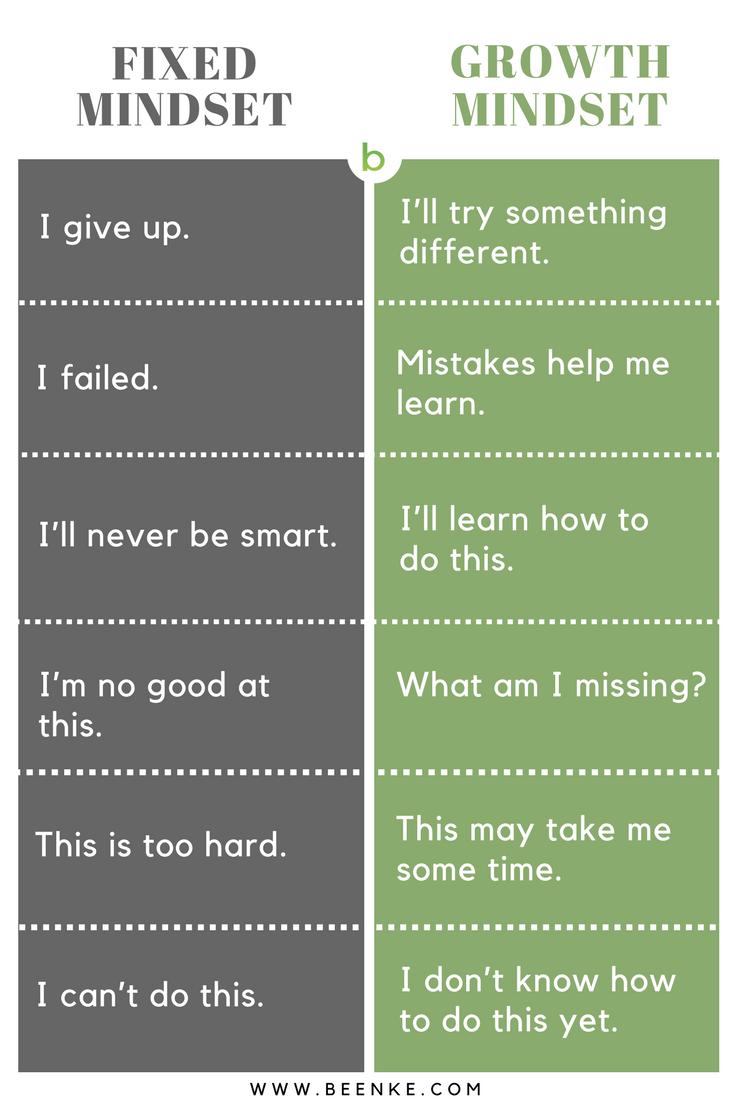Did you know that you can teach your children a mindset that will actually help them get smarter?
What if we told you this same mindset could have a significant impact on how successful and resilient your kids are in adulthood…you’d want to know what it is, right?
Welcome to growth mindset parenting! We’ll show you how adopting a growth mindset will help your kids become more resilient in the face of challenges.
We’ll also share 7 tips to teach your child to have a growth mindset so you can help them expand their mental abilities and become better learners. Let’s get started!
What Is Growth Mindset?
Someone with a growth mindset believes that his or her intelligence and abilities can continually develop throughout their life.
Basically they believe they can LEARN and therefore get smarter and more skilled through applied effort.
Stanford professor Carol Dweck, PhD is the one who originally coined the term “growth mindset”. It is now commonly uses in education and childhood development circles.
After many years of study, Dweck found that there are some commonalities amongst kids who grow up to be resilient adults. Those adults who can effectively handle stress and overcome challenges.
What she found was they shared a similar outlook on life, beginning when they were young. This outlook is what she termed a growth mindset.
Growth mindset parenting is encouraging this perspective in our children.
Kids with a growth mindset believe they can develop themselves into whatever they want to be.
They see mistakes as learning opportunities, not reasons to give up.
“We found that students’ mindsets – how they perceive their abilities – played a key role in their motivation and achievement, and we found that if we changed students’ mindsets, we could boost their achievement. Students who believed their intelligence could be developed (growth mindset) outperformed those who believed their intelligence was fixed (fixed mindset).” – Carol Dweck, PhD
Basically, growth mindset kids don’t see people as inherently “smart” or “dumb”.
The world isn’t full of natural geniuses, just people who work hard to learn and take their skills to the next level.

What Is A Fixed Mindset?
In contrast to a growth mindset, a person with a fixed mindset believes their intelligence and abilities are genetically determined and can’t be changed, even with effort.
People with this outlook tend to see mistakes as “failures” and quit when they don’t get the results they want.
They also get frustrated when asked to do a new task outside their comfort zone because they think “I’m not good at this”.
As a result, the self esteem of fixed mindset people tends to fluctuate with their success. They attribute failure to them being “good” or “bad” at something, not that it was a task they weren’t skilled at yet.
Part of growth mindset parenting is teaching kids that mistakes are okay, and that anyone can improve if they keep trying.
The good news? Research shows that growth mindset parenting can have a powerful impact on your children’s outlook. Just by changing your language and approach, you can encourage the development of a growth mindset in your kids.
This, in turn, will help them become better learners and more resilient adults who won’t quit when faced with a challenge.
Here are 7 proven tips to help you on your growth mindset parenting journey.
Growth Mindset Parenting: 7 Tips For Success
1. Teach Kids About Their Brain
The human brain is far more changeable than we once thought.
Teaching kids that they actually have control over growing their brains through the actions they take is very empowering!
Tell your kids that their brain is like a muscle, the more hard work, determination and practice they do, the more it grows.
Children should understand that their intelligence isn’t set in stone, it can change!
Knowing they can always learn new things if they put their minds to it in a cornerstone of growth mindset parenting.
Once children understand that the brain actually grows physical connections as they practice and learn new skills and concepts, they get excited about the learning process and dwell less on mistakes.
A great book to read with your child that really drives this lesson home is Your Fantastic, Elastic Brain by JoAnn Deak, PhD.
This book explains, in kid-friendly language, how the brain works and how neuron connections are made stronger through practiced effort, which makes them smarter in turn!

2. Explain The Different Mindsets
Self-awareness is an important part of the growth mindset equation.
If you want kids to use a growth mindset approach, you need to help them understand what a fixed mindset is so they can recognize when they fall into one.
Everyone is a mix of both growth and fixed mindsets. If we want to benefit from having a growth mindset, we need to be able to see when we are operating from a fixed way of thinking.
Also In Beenke: Fun Books That Encourage A Growth Mindset For Kids
By explaining the differences between the two mindsets parents can help children identify when they, or others, are giving up or not applying themselves.
This then gives them the opportunity to switch over to a more open-minded way of looking at a problem.
3. Positive Self-Talk
As the term “mindset” implies, a lot of what is going on here is happening inside your child’s head.
This is why it’s important to explain to them what their inner-voice is and to talk to them about how that voice sometimes hurts us.
A big part of growth mindset parenting is teaching kids that if they change their words, they can change their mindset.
This is a powerful lesson! (for adults too).
Also In Beenke: Boost Self Esteem! 50 Words Of Encouragement For Kids
If your child notices they are feeling frustrated, or they want to give up, teach them how to swap out negative thoughts with more positive ones.
This chart shows some ideas to help get you started:

4. Praise The Process
This one can also be called recognize and encourage effort. You want your kids to understand that hard work and practice are what will help them achieve their true potential, not just talent.
So rather than praising them when they win or succeed, recognize the times when they struggle and put effort into what they are doing.
“I have no special talents. I am only passionately curious.” – Albert Einstein
You want your kids to get comfortable with the struggle. You don’t want them to be afraid of pushing themselves to get to the next level.
Use phrases like, “I see you’ve been working hard to get that right…” or “good job taking on such a difficult task”. It’ll help your kids continue to challenge themselves.
A good book to read with kids that really illustrates this idea is The Most Magnificent Thing, by Ashley Spires.
It’s the story of a girl who encounters many failures on her path, but has the perseverance to push on and create something great.
5. The Power Of Yet
Kids grow and develop at different paces, which means they are going to be constantly running into things they can’t do that maybe their sibling or peers can. This can be super frustrating!
You don’t want your kids to internalize the “can’t” and give up. What you do want is for them to realize that just because they can’t do something now, doesn’t mean they won’t be able to do it in the future.
And that, my friends, is the power of YET.
This little word is a magical growth mindset parenting trick. It works like this…
Whenever your child says they can’t or don’t, remind them to add YET to the end of the sentence.
It completely turns the whole thing around and takes them out of a fixed mindset into a growth space.
I can’t ride a bike……YET.
I can’t draw very well….YET.
I don’t know the answer to this math problem….YET.
See how powerful that is?
A great book to read with your kids that illustrates this point is What Do You Do With An Idea, by Kobi Yamada. The story inspires kids to let their ideas grow and to not be worried if they can’t act on them yet.

6. Embrace Mistakes
One of the best ways to model a growth mindset is to speak candidly about the mistakes you’ve made, and what you’ve learned from them.
This shows your kids that taking risks and making mistakes are a natural part of the learning process.
There is nothing quite like struggling through a problem, only to finally break through and solve it. Celebrate that feeling!
Also In Beenke: How Children Succeed: Resilience and Grit
At the end of a school day ask your kids what was difficult or what they worked really hard on.
After a failure, talk about what they would do differently next time. Frame it as an opportunity, not a let down.
That’s what growth mindset parenting look like.
A great book to read with kids to drive home this point is The Girl Who Never Made Mistakes, by Mark Pett and Gary Rubinstein.
7. Drop The Labels
Don’t constantly tell your kids they are “smart”, “gifted”, or “talented”. This implies they were born with special skills and it doesn’t encourage effort, practice, or growth.
Instead of motivating kids, labels can put them in a box and communicate a fixed mindset. Not what growth mindset parenting is all about.
Also In Beenke: If You Want To Raise Resilient Kids, Don’t Make These 10 Mistakes
Research shows when individuals practice a growth mindset, they don’t feel helpless in the face of obstacles.
They know they can grow and adapt to take on new challenges. This is what any parent wants for their kids!
Developing a growth mindset takes consistency over time. But once you lay the foundation, the perseverance and problem-solving skills that your kids develop can last a lifetime.
You’ll be raising kids that see mistakes as learning opportunities, and who won ‘t quit when the going gets tough.
SHARE these growth mindset parenting tips on Facebook and Pinterest by clicking the buttons below.












